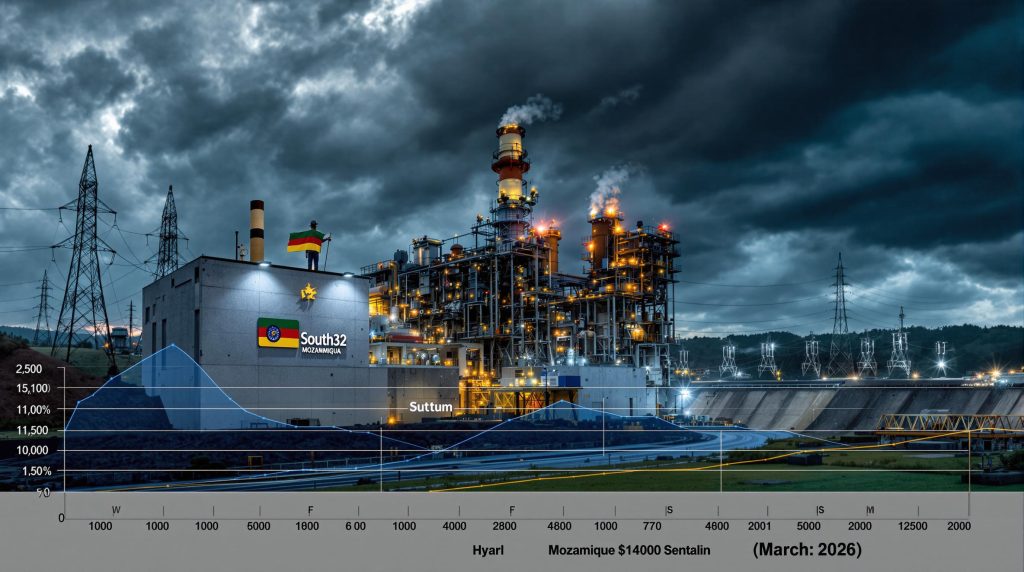Power Supply Challenges at South32's Mozal Aluminum Smelter: What's at Stake?
South32's Mozambique-based Mozal Aluminum smelter faces an uncertain future as its long-standing power supply agreement approaches expiration. With negotiations showing little progress and contingency plans already in motion, the situation highlights the complex interplay between industrial operations, energy infrastructure, and economic development in Southern Africa.
The mining giant has begun preparations for a potential shutdown while still pursuing last-minute solutions to keep this historically significant operation running beyond 2026. Furthermore, this situation exemplifies broader challenges in energy security and critical minerals that many resource companies face globally.
What is Happening with South32's Mozal Aluminum Operations?
South32's Mozal Aluminum smelter in Mozambique faces a critical juncture as its current electricity supply agreement is set to expire in March 2026. Despite ongoing negotiations with the Mozambique government and power suppliers, company leadership has expressed diminishing confidence in securing a viable renewal deal.
CEO Graham Kerr stated plainly: "Without sufficient and affordable electricity supply, we expect the operation will be placed on care and maintenance by the end of the current agreement, in March 2026." This sobering assessment signals the company's realistic outlook on the situation.
In anticipation of a potential shutdown, South32 has already initiated preparations by standing down contractors and suppliers. The company plans to halt pot relining activities in the coming weeks—a crucial maintenance process for aluminum smelters—indicating the seriousness of their shutdown preparations.
Transition Timeline
The company is methodically working through several phases of its contingency planning:
- Current phase: Contractor and supplier standdowns
- Coming weeks: Cessation of pot relining activities
- By March 2026: Complete transition to care and maintenance if no solution emerges
These preparations represent significant operational adjustments that cannot be easily reversed, underscoring the company's assessment that a viable power solution is increasingly unlikely.
Why is the Mozal Aluminum Smelter Facing Electricity Challenges?
The core of Mozal's power supply challenge stems from its reliance on the Hidroeléctrica de Cahora Bassa hydroelectric facility, a power source that has supplied the smelter since its inception 25 years ago. This dependency creates a complex negotiation dynamic, as the power infrastructure is majority-owned by the Mozambique government.
Aluminum smelting is extraordinarily energy-intensive, requiring stable, continuous power at competitive rates to remain economically viable. Any significant increases in electricity costs or uncertainties in supply reliability can quickly render operations unprofitable. The industry has been increasingly exploring electrification powering mines as a solution, but implementation remains challenging in many contexts.
Regional Electricity Market Complexities
The negotiations are further complicated by the involvement of multiple stakeholders within Southern Africa's evolving energy landscape:
- Eskom involvement: South Africa's power utility plays a role in the regional electricity supply chain
- Competing priorities: Growing domestic energy demands in Mozambique create tension with industrial exports
- Hydroelectric resource management: Changing climate patterns affect generation capacity and pricing models
These factors create a negotiation environment where industrial, governmental, and regional interests must align—a challenging proposition that appears increasingly unlikely to be resolved favorably for South32.
What Financial Implications Does This Create for South32?
The potential closure of Mozal carries substantial financial consequences for South32, with the company already announcing significant impairment charges to be reflected in its FY25 financial reports.
The total impairment is expected to reach US$568 million, with US$339 million specifically related to property, plant, and equipment. These write-downs will reduce Mozal's carrying value to approximately US$86 million—a fraction of its previous valuation.
In terms of operational impact, the closure would eliminate a significant revenue stream. Mozal generated over $800 million in revenue during the previous fiscal year, representing a substantial contribution to South32's overall financial performance.
Accounting Treatment
South32 has indicated that these impairment charges will be excluded from underlying earnings calculations for FY25. As CEO Graham Kerr explained: "This impairment reduces Mozal's carrying value to US$86M, with the impairment to be excluded from FY25 underlying earnings."
This accounting approach aims to provide investors with a clearer view of ongoing operational performance separate from the one-time write-down, though the revenue impact would be felt in subsequent years if operations cease.
How Has the Market Responded to This Announcement?
Curiously, the market's initial reaction to South32's announcement has shown unexpected resilience. Rather than the share price decline that might be anticipated following news of a major asset impairment, South32 shares actually increased by 0.33% to $3.06 in initial trading following the announcement.
This counterintuitive response suggests investors may be:
- Already pricing in the possibility of Mozal's closure
- Focusing on South32's broader portfolio performance
- Maintaining optimism that a last-minute solution might emerge
With South32's market capitalization standing at approximately $13.78 billion, the Mozal impairment represents about 4% of the company's total market value—significant but not catastrophic to the overall investment thesis.
Longer-Term Outlook Considerations
While initial trading has shown resilience, investors will likely reassess South32's portfolio diversification and growth prospects in the coming months. Key factors that could influence longer-term market sentiment include:
- The company's success in redirecting capital to alternative growth assets
- Performance of South32's remaining aluminum operations
- Overall commodity price environment for the company's diversified portfolio
Market analysts will be watching closely for signs of how this potential closure fits into South32's broader strategic direction and capital allocation priorities.
What is the Historical Significance of Mozal Operations?
The Mozal aluminum smelter has maintained a continuous presence in Mozambique's industrial landscape for a quarter-century, making it one of the country's longest-running major industrial operations. Over this 25-year period, the facility has played a pivotal role in the region's economic development.
CEO Graham Kerr acknowledged this legacy, stating: "We're proud of Mozal's 25-year history and its economic and social contributions to the country." These contributions extend beyond direct financial impacts to include skills development, community investment, and infrastructure improvements.
Strategic Importance
Mozal's significance extends beyond its revenue generation:
- Economic catalyst: The operation has helped attract additional investment to Mozambique
- Skills development: Technical training and knowledge transfer to local workforce
- Industrial ecosystem: Supporting businesses and supply chains throughout the region
The potential closure of such a long-standing operation represents not just a financial challenge for South32, but also a significant transition for the regional economy that has developed around it. It also highlights missed opportunities for South Africa mineral beneficiation and similar value-adding strategies in the region.
What Options Remain for South32 Regarding Mozal?
Despite the advanced preparation for potential closure, South32 continues to pursue multiple avenues that could potentially preserve Mozal's operations beyond March 2026.
The company maintains ongoing dialogue with Mozambique government officials, Eskom representatives, and Hidroeléctrica de Cahora Bassa leadership. While current discussions "do not provide confidence" according to company statements, the door remains open for a breakthrough.
Operational Contingency Planning
Simultaneously, South32 is advancing comprehensive contingency planning:
- Asset preservation: Developing strategies to maintain the facility in operational condition during care and maintenance
- Workforce transition: Planning support systems for affected employees
- Stakeholder management: Coordination with suppliers, customers, and community partners
This dual-track approach allows South32 to responsibly prepare for closure while remaining open to solutions that could emerge during the remaining negotiation period.
How Might This Impact Aluminum Markets?
The potential closure of Mozal raises questions about aluminum supply dynamics, particularly within Southern Africa and export markets that have historically sourced material from the operation.
While global aluminum markets are influenced by numerous factors, the removal of Mozal's production capacity could create localized supply constraints, particularly for customers with established supply chains connected to the facility.
Supply Considerations
Potential market adjustments could include:
- Regional sourcing shifts: Customers may need to develop alternative supply relationships
- Logistics reconfiguration: Transportation and delivery systems may require modification
- Product specification adaptations: Downstream manufacturers may need to adjust processes for alternative aluminum sources
These adjustments would likely cause short-term disruption before markets recalibrate to the changed supply landscape.
Pricing Implications
While global aluminum prices are primarily driven by larger market forces, regional pricing dynamics could see adjustments based on:
- Transportation differentials: Changed logistics costs as supply sources shift
- Product specification premiums: Potential value adjustments for specific grades or forms
- Contract renegotiations: Term agreements may require revision to accommodate new supply realities
The specific price impact will depend on how quickly alternative supply sources can be integrated into affected supply chains.
What Does This Reveal About Risks in Resource Operations?
The Mozal situation highlights several fundamental challenges inherent to resource operations, particularly those in energy-intensive industries.
Infrastructure Dependency Challenges
Aluminum smelting exemplifies the vulnerability of operations that require significant, continuous infrastructure support:
- Power supply criticality: Uninterrupted electricity at competitive rates is non-negotiable
- Long-term contract risks: Operations built around decades-long agreements face renewal uncertainties
- Governmental policy exposure: Changes in national priorities can fundamentally alter operating environments
These dependencies create structural vulnerabilities that require sophisticated risk management strategies. Many mining companies are now exploring renewable energy in mining as a way to reduce these vulnerabilities.
Strategic Diversification Importance
The potential Mozal closure underscores the importance of diversification across several dimensions:
- Geographic spread: Distributing operations across multiple jurisdictions mitigates regional challenges
- Energy source variety: Developing multiple power supply options provides operational resilience
- Product portfolio balance: Maintaining production across different commodities reduces exposure to any single market
Companies that effectively balance these diversification strategies can better withstand the localized challenges that may arise in any particular operation or region. Additionally, implementing sustainability transformation in mining practices can further strengthen operational resilience.
FAQs About South32's Mozal Situation
When exactly will Mozal operations cease if no power agreement is reached?
The current electricity supply agreement expires in March 2026, after which South32 expects to place the operation on care and maintenance if no viable solution emerges.
What percentage of South32's aluminum production comes from Mozal?
Mozal represents a significant portion of South32's aluminum portfolio, with the facility generating over $800 million in revenue during the previous fiscal year.
Are there alternative power sources being considered for Mozal?
South32 continues discussions with various stakeholders including Eskom and Hidroeléctrica de Cahora Bassa representatives to explore potential solutions, though specific alternatives haven't been detailed.
How many employees might be affected by a potential shutdown?
CEO Graham Kerr has acknowledged the significant impact on personnel and committed to supporting employees through the transition process, though exact workforce numbers haven't been specified.
Could the Mozambique government intervene to prevent the closure?
As the majority owner of the Hidroeléctrica de Cahora Bassa power generator, the Mozambique government holds significant influence over the situation, but current negotiations "do not provide confidence" according to South32.
Key Statistics: South32's Mozal Operation
| Metric | Value |
|---|---|
| Current carrying value | US$86 million (post-impairment) |
| Expected impairment charge | US$568 million total |
| Property/equipment impairment | US$339 million |
| Previous year's revenue | Approximately $800 million |
| Current power agreement end date | March 2026 |
| Operational history | 25 years |
Further Exploration
The Mozal situation illustrates broader themes relevant to resource operations globally—the delicate balance between industrial development, energy infrastructure, and economic sustainability. It also demonstrates how seemingly secure long-term arrangements can face unexpected challenges as economic and political landscapes evolve.
For investors, the case provides important lessons about assessing infrastructure dependencies when evaluating resource companies. The resilience of South32's share price despite the significant impairment suggests markets increasingly incorporate such risks into their valuation models.
As the March 2026 deadline approaches, the Mozal operation's fate will serve as an important case study in how major resource companies navigate complex operational transitions in developing markets.
Disclaimer: This article contains forward-looking statements regarding potential market impacts and operational outcomes. Actual results may vary significantly based on numerous factors including governmental decisions, market conditions, and company strategy adjustments. Readers should consider this analysis as informational rather than as financial advice.
Interested in Catching the Next Major Mineral Discovery?
Discovery Alert's proprietary Discovery IQ model instantly notifies investors of significant ASX mineral discoveries, providing actionable insights before the broader market reacts. Explore why major discoveries can lead to exceptional returns by visiting our dedicated discoveries page and start your 30-day free trial today.




